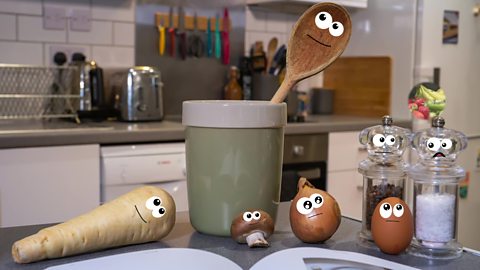Why do we all eat different food?
We all different food for many different reasons. Some people have food allergies, like a gluten or dairy allergy. Others might follow a certain type of diet for religious or personal reasons.
In this article you can learn:
- why we all eat different food
- about different food allergies
- what a food intolerance is
- how religious beliefs affect food choices
- how culture can affect food choices
This resource is suitable for Health and Wellbeing for primary school learners.
Video - Food choices and needs
In this video, we visit the supermarket to find out how different things can affect our food choices and needs, such as allergies, intolerances, religious beliefs and culture.
Find out why we all eat different diets.
DAIRY MILK Hello Bread. Welcome to the basket.
UNKNOWN VOICE Hi there!
DAIRY MILK How did you do that?
BREAD Do what?
DAIRY MILK Speak without moving your mouth?
BREAD That wasn’t me.
GLUTEN FREE BREAD It was me! Hello!
DAIRY MILK Argh! What’s going on!?
BREAD Hello!
DAIRY MILK There are two of you!
GLUTEN FREE BREAD We’re cousins!
DAIRY MILK Cousins?
BREAD We’re the same but I’ve got gluten in me…
GLUTEN FREE BREAD …and I’m gluten free!
DAIRY MILK Eh?
GLUTEN FREE BREAD Gluten is a protein found in wheat and other grains. Some humans can’t digest the gluten in bread. Not all human bodies are the same and this can affect the food that they are able to eat.
PEANUTS Like me. Some people can’t eat peanuts because they are allergic to me and I will make them ill.
GLUTEN FREE BREAD Luckily, it is possible to make different versions of foods. So I am Bread but without the gluten!
BREAD Other than that, we are the same - best…
GLUTEN FREE BREAD …friends! We can even finish each other’s…
BREAD …s˛ą˛Ô»ĺ·Éľ±ł¦łó±đ˛ő!
GLUTEN FREE BREAD No.
BREAD Sentences!
GLUTEN FREE BREAD That's better.
DAIRY MILK I never knew people had to eat different things.
MEAT 1 Sometimes it’s because of their body. Sometimes it’s because of religion or beliefs. See over there in that basket? That’s my cousin. I'm Beef, that’s Halal Beef.
DAIRY MILK Oh, hello! I hope I don’t sound rude, but what does Halal mean?
MEAT 2 I’m Halal Beef because I’ve been prepared according to guidelines in the Qu’ran, the sacred text of Islam. That means that Muslims are allowed to eat me.
Other religions have rules about what people can and can’t eat too. Jewish people have rules about what foods are Kosher. If it’s Kosher, it is fit for them to eat.
BREAD What about you Milk? Are there different milks for different people?
DAIRY MILK Oh, I don’t know. I don’t think so.
GLUTEN FREE BREAD What about them?
OAT MILK Helloooo, pal!
GLUTEN FREE BREAD Are you Milk?
OAT MILK Yes. I’m Oat Milk.
DAIRY MILK Oat Milk?!
OAT MILK Yes. I’m off to help out a family who can’t drink dairy products! I’m made of oats! Or you can get milk made from soya beans, almonds, coconuts.
PEANUTS Milk made from nuts?
OAT MILK Yep. People who can’t digest dairy or who choose not to eat animal products can pour me over their cereal instead.
PEANUTS Nuts?!
BREAD It doesn’t matter what we are made of, we are all brilliant and helpful in our own way.
PEANUTS How do you milk a nut?
OAT MILK You soak nuts, grind them up and drain them.
EVERYONE Aaah!
PEANUTS I wish I hadn’t asked.
What are dietary requirements?
Advances in food production mean that we have a huge variety of food and drink to choose from. Learn more about food production.
What we eat and drink is known as our diet.
Many people have special dietary requirements. This is a diet that contains or misses out specific foods. Diets can vary for a range of reasons including:
- allergies, intolerances or health issues
- religious beliefs
- cultural choices
What are food allergies?
The immune system defends our bodies from bacteria and viruses. It tries to prevent us from getting really unwell and helps us get better if we become ill.
A food allergy is when our immune system has an extreme reaction to eating a particular food.
- Some food allergies can be dangerous.
- Some symptoms of a food allergy are swelling, itching or difficulty breathing and swallowing.
- People with a food allergy must be careful to avoid that food to stay safe and feel well.
- People can be allergic to a whole range of different things.
- The most common food allergies are milk, nuts, eggs, fish (especially shellfish) and gluten.
- Luckily, if you have a food allergy there are lots of other options.
Milk allergy
Being allergic to milk is quite common. Many products we eat are made from dairy milk, like cheese, butter or ice-cream. Dairy milk is a source of calcium that we need to have strong bones.
There are lots of dairy-free options for people who can't eat them. Some examples include milk made from different plants such as soy, almond, coconut or oat. Lots of dairy-free foods have extra calcium added.
Gluten allergy
Many people have an allergy to gluten. Gluten is a protein which can be found in grains like wheat and rye.
Lots of our everyday foods that are made with flour, like bread, biscuits and pasta, contain gluten. Many of these foods can be made using different grains and you can now buy gluten-free alternatives.
A gluten allergy is different from a gluten intolerance or coeliac disease.
Peanut allergy
People who are allergic to peanuts must avoid eating them. Some people must also avoid contact with peanuts in any way.
If eating in a restaurant, they need to make sure that peanuts have not been prepared near their food and that the food hasn't been cooked in peanut oil. Peanut oil is sometimes called groundnut oil. They must keep their distance from other people eating peanuts if it is a severe allergy.
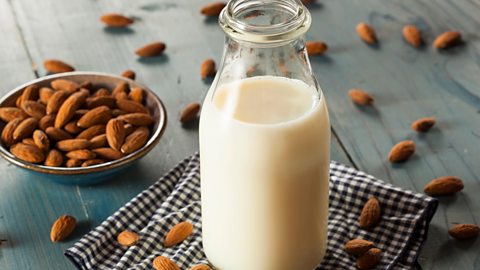
Image caption, Milk
People who cannot drink dairy milk can drink plant-based milk instead. For example, we can make milk from almonds. (Brent Hofacker / Alamy Stock Photo)
Image caption, Gluten
People who are allergic to gluten may eat gluten-free versions of foods, like bread and pasta. (Stephen Barnes / Food and Drink / Alamy Stock Photo)
Image caption, Peanuts
People with a peanut allergy must avoid eating peanuts. Even touching peanuts can bring on an allergic reaction for some people. (Alamy Stock Photo)
Image caption, Eggs
People with an egg allergy have to check ingredients lists carefully because egg can be found in many food products, like cake or pasta. (Kevin Britland / Alamy Stock Photo)
Image caption, Fish
Many people are allergic to fish - particularly shellfish such as prawns and mussels. (The Picture Pantry / Alamy Stock Photo)
1 of 5
What is a food intolerance?
- A food intolerance is different from a food allergy (when your immune system takes an extreme reaction to food).
- Food intolerances are less serious. They will not cause life threatening symptoms.
- Food intolerances can affect digestionA process in the body where food is broken down so that its nutrients and energy can be absorbed. and cause uncomfortable symptoms, like headaches or bloating.
- A food intolerance usually means you should eat less of that food rather than having to completely avoid it, like an allergy.
What is coeliac disease?
- People with coeliac disease must be very careful not to eat glutenA protein which can be found in grains like wheat and rye.
- Coeliac disease causes your immune system to damage your intestines when you eat any gluten. This can be very painful and can stop your body absorbing nutrients properly.
- It is very important that people with coeliac disease don't eat food that has been contaminated with gluten when it is processed, cooked or served.
How religious beliefs affect food choices
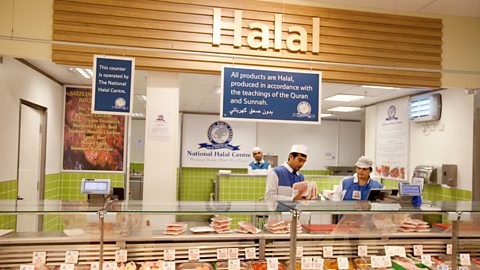
People who follow a religion usually have a specific set of beliefs. Some of those beliefs might change the type of food they eat. For example:
- Kosher is a set of rules about how to prepare and eat food following Jewish teachings found in the Torah. For example, kosher food does not include pork or any shellfish. Meat has to be prepared in particular ways and dairy and meat products have to be kept completely separate.
- Halal is the name given to foods that are allowed according to Islam. Some foods need to be prepared and eaten in a certain way following Islamic teachings found in the Qur'an.
- Many Hindus avoid eating beef as part of their beliefs.

How culture affects food choices
cultureA common set of ideas or values. can also influence our diet choices.
Many people choose to follow a specific diet for a whole range of reasons, including protecting the environment and animal welfare.
Common examples of special dietary requirements include:
- Vegetarians don't eat meat. They will usually still eat other animal products, like dairy or eggs.
- Vegans don't eat meat or any food product that has come from an animal, like cheese and milk.
- Pescatarians do not eat meat but eat fish and other animal products.
Test your knowledge
Quiz - Special dietary requirements
Challenge - Design a menu
Following a specific diet can have challenges. For example, having a food allergy can be difficult as it can be tricky to find safe things to eat, especially when eating out.
Food menus should have lots of detail to show what is contained in dishes. Often there are labels to help people make decisions based on their needs and choices, such as:
- V to show if items are vegetarian
- GF to show if the item is gluten-free
Can you design a menu for someone with special dietary requirements?
More on Food and health
Find out more by working through a topic
- count5 of 10
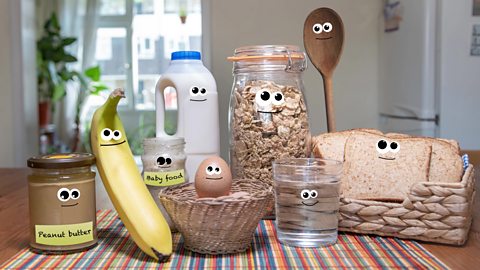
- count6 of 10
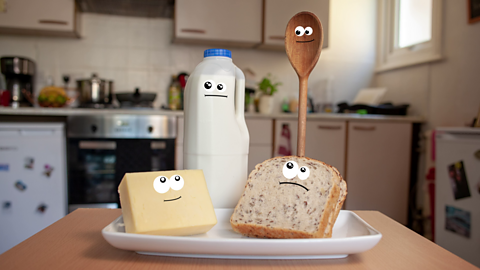
- count7 of 10
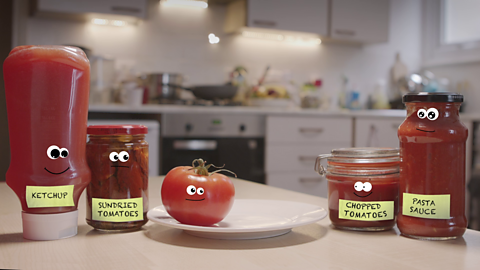
- count8 of 10
